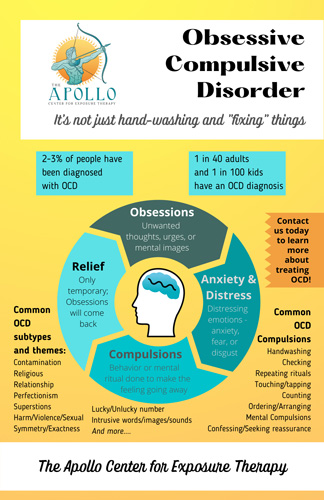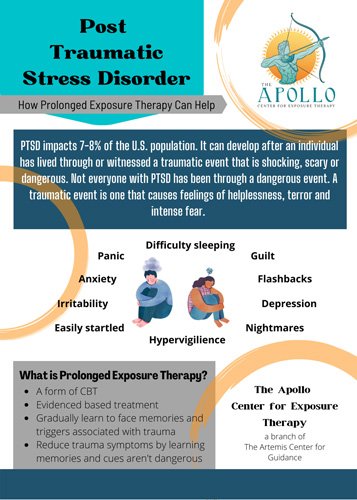Anxiety Disorders
Evidenced-based Exposure Therapy for Anxiety Disorders
Anxiety disorders are the most common mental health concern in the United States. They impact 19.1 % of the US population, that is nearly 1 in 5 US adults and 7.1 % of children ages 3-17, or nearly 1 in 13 children. Anxiety can interfere with daily activities such as job performance, school work, and relationships. There are several different types of anxiety disorders including, Generalized Anxiety Disorder, Social Anxiety Disorder, Phobias, Panic Disorder, Obsessive Compulsive Disorder and Post-traumatic Stress Disorder (PTSD). All anxiety disorders have one thing in common, which is persistent, excessive fear or worry in situations that are not threatening.
Experiencing occasional anxiety is an expected part of life. Individuals might feel anxious when faced with a situation at work, making an important decision or before taking a test. This feeling is usually temporary and resolves once the situation is resolved. For individuals with anxiety disorders the anxiety persists and interferes with important areas of their daily functioning, for example, their relationships, their academics, and their work performance. . Experiencing anxiety is a lot like experiencing fear but with anxiety there is no real danger. Anxiety disorders can lead to individuals avoiding situations that make them anxious and while this works temporarily, the anxiety tends to get worse over time.
Cognitive Behavioral Therapy (CBT) is a highly effective treatment for Anxiety Disorders. CBT helps to identify unhelpful thinking patterns that contribute to anxiety and teaches effective ways to respond to situations. CBT also uses exposure therapy where an individual works with a therapist to create a plan to gradually face situations that trigger their anxiety. By exposing an individual repeatedly to situations that make them anxious, they learn that what they fear does not happen and that they are able to tolerate their anxiety. Some individuals report that following exposure therapy they are also able to gain a sense of control and mastery over these situations, which also helps to decrease their anxiety.
Generalized Anxiety Disorder
Generalized Anxiety Disorder (GAD) is one of the most common mental disorders. It impacts approximately 3% of the US population and 1 in 4 children between the ages of 13-18. GAD is characterized by persistent and excessive anxiety or worry about everyday activities or events where the anxiety or worry is out of proportion to the situation.
Individuals with GAD tend to have difficulty controlling their worry. They can feel nervous, anxious, irritable or on edge and have difficulty concentrating. Physical symptoms of anxiety can include fatigue, difficulty sleeping, headaches, sweating, racing heart, difficulty breathing, muscle tension and upset stomach. Children and teenagers may have similar worries to adults, but also may have excessive worries about their performance in school or in sports, catastrophes, such as earthquakes or war, safety of family members and being on time (punctuality).
Social Anxiety Disorder
Social Anxiety Disorder impacts 6.8% of the U.S. population. It is characterized by an intense fear about being embarrassed or humiliated in social situations. Individuals with social anxiety disorder tend to avoid situations where they fear they may be judged negatively by others. They may avoid going out in public, engaging in conversations or participating in discussions at work or school.
Panic Disorder
Panic disorder impacts 2.7% of the U.S. population It is characterized by unexpected and repeated panic attacks without an apparent cause or reason. Panic attacks can occur without a noticeable trigger and individuals with Panic Disorder may constantly worry about when the next panic attack may occur, which can lead them to avoid situations and isolate themselves. Symptoms of a panic attack include heart palpitations or increased heart rate, shortness of breath, shaking or trembling, sweating, dizziness, nausea, and /or feeling detached from reality. Individuals also experience a sense of terror and feel like they are “going crazy,” dying or losing control. Some individuals will go to the Emergency Room believing they are having a heart attack or a medical emergency, especially if they have never experienced a panic attack before.
Phobias
Phobias impact 8.7% of the U.S. population. They are characterized by a persistent and excessive fear of a specific object or situation. Some individuals may be fearful of specific situations, like flying on an airplane, being in enclosed spaces or going to school. Others may be fearful of the natural environment, such as thunderstorms or heights, or fear animals or insects. Other common phobias include fear of blood, needles or medical procedure and fear of choking, vomiting or loud noises. Individuals with Phobias will try to avoid the objects or situations that they fear and phobias can lead to panic attacks for some individuals.
Additional Offerings
We also offer empirically based treatments for Obsessive Compulsive Disorder (OCD) and Post-Traumatic Stress Disorder (PTSD). To learn more click the corresponding link.











